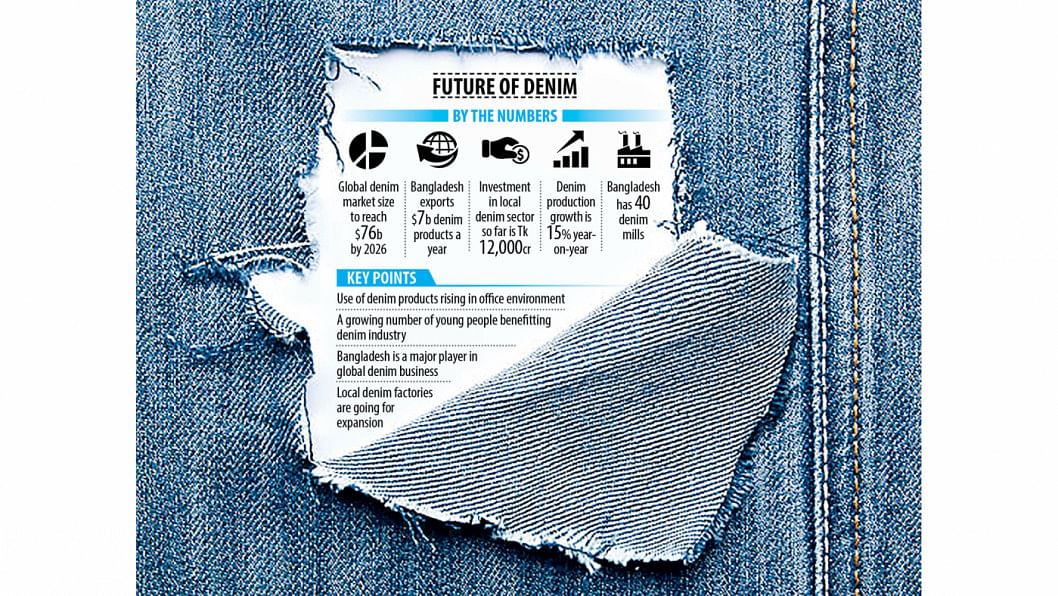Denim mills expand as global market booms

Fabric makers in Bangladesh have embarked on a massive expansion to capture more share of the fast-growing global denim market keeping pace with the changing fashion and styles.
Bangladesh, the second-largest apparel exporter in the world, is already a top denim products supplier in the US and European markets. In fact, one in every three denim items sold in Europe is actually made in the country.
Currently, 40 denim mills are producing 280 lakh metres of denim fabrics in Bangladesh, up 40 per cent from five years ago. Denim fabrics makers have appetite to grow further. And their ambition was fittingly brought up in the report of the Research and Markets, a global market research firm, last week.
"Bangladesh seeks bigger roles in denim jeans production," it said.
The global denim jeans market will spike to $76.1 billion by 2026, up from $57.3 billion in 2020, according to the analysis.
The firm attributed the anticipated success to a number of factors, including the casualisation movement that has infiltrated the workplace, where jeans are becoming increasingly commonplace.
A growing army of young people entering the workforce has fueled the growth of the denim industry as the demographic largely opts for more casual office attire.
The projection echoes recent data from retail intelligence platform Edited, which shows denim sales were up 10 per cent in 2021 from a year ago.
It rose 27 per cent in the first week of 2022 compared to the same period last year, the analysis said.
In Bangladesh, denim fabrics producers and exporters also acknowledged the research findings as they are reaping the benefit of the expanding global denim business.
For instance, Envoy Textile Ltd produces 4.42 million metres of denim fabrics a month, up from 3.5 million metres two years ago.
"Currently, we are fully booked with orders from the international retailers and brands," said Kutubuddin Ahmed, chairman of Envoy Textile. "The business is reviving at a faster rate from the severe fallouts of Covid-19."
Envoy Textile ships more than $120 million worth of denim products a year to Europe and the US and is bringing diversification to denim products with new investment to meet the growing demand for the items.
Amber Denim Ltd has expanded its capacity to make the most of the growing demand. Currently, it is producing nearly 40 lakh metres of denim fabrics a month, which was 35 lakh metres two years ago.
"The denim sector is growing at 15 per cent as people are investing in the promising sector," said Showkat Aziz Russell, chairman of Amber Denim.
Mostafiz Uddin, managing director of Denim Expert, calls denim the future of business for Bangladesh.
Currently, local millers are capable of supplying denim fabrics as per the demand of exporters as they have invested a lot of money over the last few years. This has pushed up the exports from the segment.
In the fiscal year of 2013-14, the export of denim products was worth nearly $1 billion. Now it has crossed $7 billion and most of the raw materials are supplied by local millers.
"The global denim market size will increase every year and Bangladesh's market will also grow. It is not unexpected," said Mostafiz, who organises an exhibition in Dhaka to show denim products.
Tk 12,000 crore has already been invested in the denim segment, an increase of 40 per cent from five years ago, according to Monsoor Ahmed, chief executive officer of the Bangladesh Textile Mills Association, the platform for the primary textile sector.
"Denim millers have also brought a lot of product variations to meet the demand of international retailers and brands."
The global market for denim jeans was estimated at $64.5 billion in 2022 and is projected to reach a revised size of $76.1 billion by 2026, growing at 4.8 per cent annually.
The denim jeans market in the US, the single largest apparel destination of Bangladesh, is estimated at $15.8 billion this year. The country currently accounts for a 24.6 per cent share in the global market.
China is forecast to reach an estimated market size of $15.5 billion in 2026, with an annual growth of 7.2 per cent, the analysis said.

 For all latest news, follow The Daily Star's Google News channel.
For all latest news, follow The Daily Star's Google News channel. 



Comments